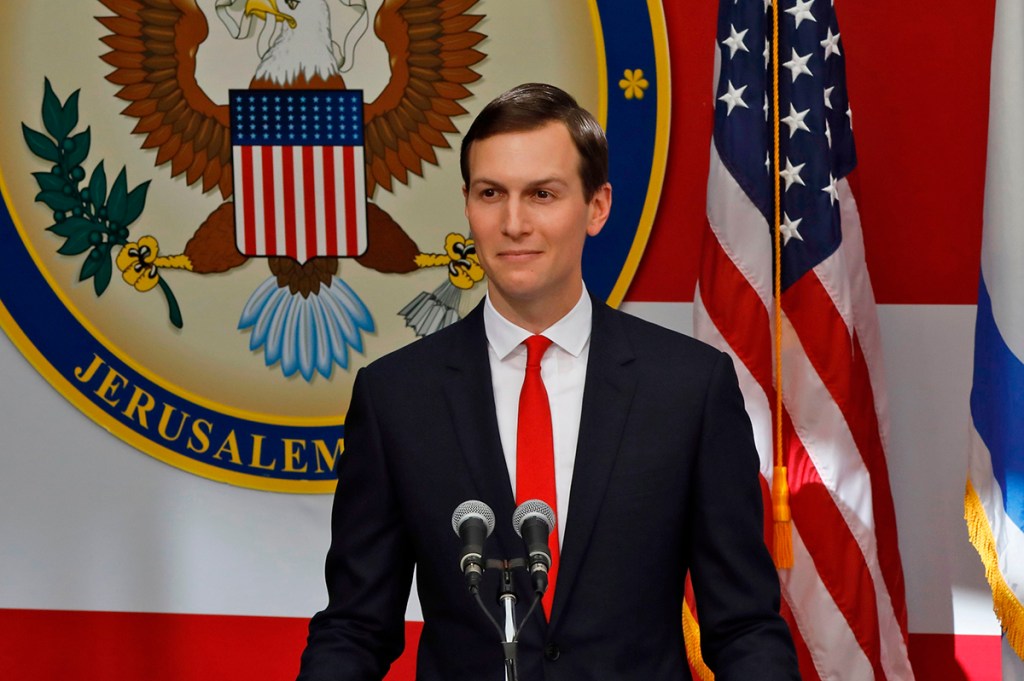For most Jewish Americans, Jared Kushner is the son-in-law and counselor of a president they didn’t vote for in 2016. He prays with a punctiliousness they romanticize but prefer not to emulate. Jared’s grandparents learned about history the hard way: they survived the Holocaust and immigrated with no money and little English. The typical Jewish American grandparents are boomers who vote Democratic all the way down the card. They believe America is different for the Jews, even if they were raised to believe that difference was un-American and bad for their careers. And here comes Jared, a frum Jew who married the boss’s blonde daughter.
It could be a romance from Washington Irving’s Tales of the Alhambra. Less romantically, it is a tale from history. As Vladimir Putin sent Kushner a vial of earth from his grandmother’s village in Russia in case the little Zhid forgot who he was, so an ancient archetype returns in Kushner’s spindly form to remind Jewish Americans who they are once more. Americanization is over. The modern United States is as diverse and sectarian as the old empires of Russia or Austria were. American Jews are once again one nation among many. Kushner is their Hofjude, a ‘court Jew’, a privileged fixer with connections. In the bad old days, the Jews had a good name for him: the shtadlan, the ‘one who tries’, the communal emissary who appealed on behalf of his community to their owner and patron, the local prince or duke. He’s a fiddler on the roof of 1600 Pennsylvania Avenue.
Only in America. And only in America would the Jews complain about it. In the modern history of the Diaspora, only five Jews, three British and two American, have reshaped the fate of the Jews by remaking the political value of the Land of Israel. The first was Benjamin Disraeli, who in 1875 arranged for Queen Victoria’s government to buy a controlling stake in the Suez Canal. The second was Chaim Weizmann, who in 1917 was vital in securing the Balfour Declaration’s promise of a ‘Jewish national home’ in Palestine. The third was the only Jewish member of the British cabinet, Edwin Montagu, whose opposition produced a clause about protecting the ‘civil and religious rights of existing non-Jewish communities’ — the people who later became the modern Palestinians. The fourth was Henry Kissinger, who turned Israel’s victory in the Yom Kippur War of 1973 into the foundations of the Israeli-Egyptian peace treaty of 1979.
The fifth is Kushner, the face and driving force of Trump’s ‘Deal of the Century’. Closer to Trump than Kissinger was to Nixon, Kushner wants to lay the ghost of Montagu and finish Kissinger’s job: to complete the integration of his tribe into the Middle East. If he succeeds, he joins Disraeli and Weizmann in the ancient pantheon of Jewish heroes, as well as the less populous modern pantheon of American diplomats who didn’t get burned in the sand. If he fails, he’ll damage America’s regional alliances and Israel’s most important diplomatic relationship. He’ll also damage the already frayed relationship between the Israeli and American halves of the Jewish people.
Kushner may have been a Democrat, but he’s not a democrat. Kushner’s Jews, the Modern Orthodox, are a minority within a minority. They’re disproportionately prominent in sustaining Jewish life in America, but are socially distinct: a kind of intellectual and social aristocracy. The modern Orthodox are more hawkish than most Jewish Americans. They vote Republican and visit Israel too. Kushner is by temperament an autocrat, like his allies the Gulf princes Mohammed bin Zayed of the UAE and Mohammed bin Salman of Saudi Arabia.
The Jersey boy shares this sense of being an outsider with his partner in this victor’s peace. Benjamin Netanyahu’s historian father was a right-winger who was excluded from Israel’s universities when the socialists ran the new state. Trump, the king of Queens, was, like the Kushners, an outsider among the big Manhattan developers. The Trump plan, which is the Kushner plan, is a bridge-and-tunnel real-estate affair designed by bridge-and-tunnel people.
[special_offer]
Kushner at least sees that the Oslo Process and ‘land for peace’ died 20 years ago in the suicide bombings of the Second Intifada. There can be no Palestinian state worth the name: the least the Israelis can accept on security grounds is short of the least that the PLO can offer, and irrelevant to the genocidal Islamists of Hamas. The Israelis are now a high-tech superpower, and the Gulf Arabs are afraid of Iran. The Americans are leaving and the Russians are moving back in. Everyone knows that the regional balance has shifted, except, it seems, the State Department and the European chancelleries.
By endorsing Israeli annexations, Kushner has called the Palestinians’ bluff: if they don’t negotiate, they’ll be boxed into a Potemkin state. But Netanyahu is bluffing Kushner. Netanyahu bluffs everyone. His grand strategy is tactical: to look busy without rocking the boat. In time, Netanyahu reckons, the fair winds of Jewish demography and the foul storms of Arab rivalry will steer the ship of state into harbor. Netanyahu has already assured the settlers that the annexations won’t lead to negotiations.
Kushner understands past failures and present realities, but not the irrationalities that will determine the future. He believes that the Israeli-Palestinian conflict can be solved by mutual prosperity. True, Israel can subcontract security to strongmen in Ramallah and Hebron while Palestinian incomes continue to rise. But that won’t be enough to stifle Palestinian nationalism or end the conflict. Middle East diplomacy is a mart even more ruthless than New Jersey real estate. Entering with a big pitch rather than crisis management, Kushner will lose his balance as all outsiders do.


















